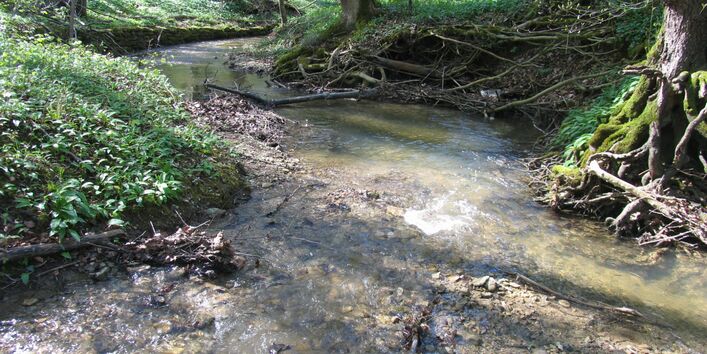UBA names water body type of the year 2020
The German Environment Agency (UBA) declared the coarse substrate-dominated, calcareous small highland river as the water body type of 2020 on the occasion of World Water Day on 22 March 2020. Streams of this type occur primarily in the limestone regions of the central highlands , for example in the Swabian Alb and Frankish Alb. Only eight percent achieve 'good' ecological status. Real improvement can only be achieved by giving this water body – and all streams and rivers – more space to meander. Fewer inputs of nitrogen and phosphate to these rivers must also be ensured. This can be achieved through more rigorous water pollution control and implementation of the European Water Framework Directive.
UBA traditionally names the water body of the year on World Water Day, which was launched by UNESCO in1992. The theme of this year's World Water Day is "Water and Climate Change". The drought in the summers of recent years are proof that climate change can affect water supply in Germany too. It is becoming urgent to treat water and our water bodies with greater care.
Coarse and calcareous small highland rivers often only carry water after rainfall or after the snow has melted. Climatic changes in the amount of precipitation or evaporation can therefore severely affect the water flow of this type of stream. The streams are naturally overshadowed by shrubs. The shading ensures natural temperature regulation in midsummer. The cool summer water can also absorb more oxygen. The fauna native to the streams depend heavily on the water oxygen content. Typical organisms are the minnow, caddisfly and the fire salamander, common spring moss and blue-green algae.
These streams are seldom teeming with life nowadays. Nutrient inputs from adjacent areas are common and can cause excessive plant growth and low oxygen levels. Intensive use of large machinery in the vicinity of the water is paired with straightening of the watercourse and, frequently, deforestation of the riparian woodlands. The lack of shade means higher temperatures in summer, which is detrimental to life for many aquatic organisms in highland streams. All these changes make a formerly diverse water structure, monotonous. The result is what experts call "structural degradation".
Experts have long agreed on how the condition of this type of stream and all rivers and streams in Germany can be improved: they need enough space on both sides to fully develop their natural functions. This benefits both nature and people in times of increasing weather extremes. Flood waves can also be mitigated with such measures. In low water periods, floodplain meadows serve as reservoirs. Less bare wasteland along the water also means more recreational value. The German Environment Agency therefore recommends designating official water development areas in which uses of the water as resource is not significantly impaired.
The water body type of 2020 is just one example of a water body which does not have good ecological status and requires better protection. These are the findings of studies by the German Environment Agency entitled "Waters in Germany: Status and Assessment" and "Water Management in Germany" and in reports on the EU Water Framework Directive. Implementation of this important European Directive must be intensified.
